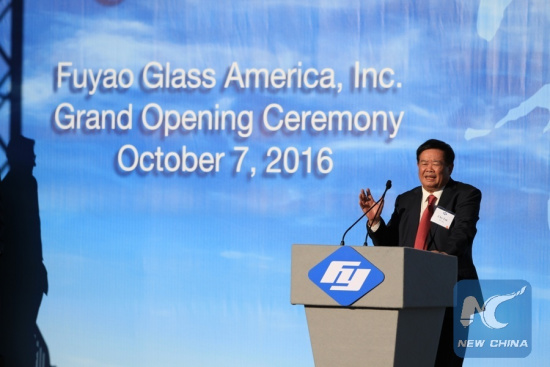
Chairman Cao Dewang of Fuyao Glass Industry Group delivers a speech at the opening ceremony of the new U.S. facility in Moraine, Ohio, the United States on Oct. 7, 2016. (Xinhua/Wang Naishui) (File photo)
A famous Chinese entrepreneur's high-profile rebuttal of a recent report by The New York Times has drawn a lot of attention across the Pacific in the past few days, reviving a long-lingering question: what makes U.S. mainstream media's reports about Chinese companies so controversial?
Cao Dewang, founder and president of Fuyao Glass, the world's largest auto glass manufacturer, dismissed the NYT report about his factory in Dayton, the U.S. state of Ohio, as inaccurate and unbalanced.
During interviews with the Chinese media, Cao said that local government believes Fuyao's investment in Dayton has brought tremendous positive changes to the local community, calling the NYT report "a false one."
The Dayton factory, which officially started operation in October 2016, currently employs some 2,000 American workers.
In a report published earlier this month, the NYT claimed that "at Fuyao, a major culture clash is playing out on the factory floor, with some workers questioning the company's commitment to operating under American supervision and American norms." The report also questioned Fuyao's labor and safety standards.
"The New York Times didn't visit or interview any current employees at Fuyao's Dayton factory. Instead, it only talked with a few former employees and union activists, who are biased to a certain degree," said Cao, adding that Fuyao's factory in Dayton has been strictly observing U.S. laws and regulations.
Fuyao is the second major Chinese company with U.S. investment and operations that has refuted U.S. mainstream media reports so far this month.
ICBC Financial Services, the U.S. brokerage unit of Industrial & Commercial Bank of China Ltd. (ICBC), is in strict compliance with local regulatory policies and risk-management rules, said ICBC USA in a statement issued shortly after a Bloomberg News report alleged the company was "profiting from the murky world of shadow banking."
The Bloomberg story claimed that ICBC Financial Services had roughly 260 U.S. dollars in assets for each dollar of capital at the end of 2016, over 10 times the leverage used by J.P. Morgan's securities unit. It added that the bank has exploited "loopholes in post-crisis (the 2008 financial crisis) rules" to emerge as a major U.S. dealer in government debt repos, which could pose a threat to financial stability.
But in its statement, which later was also published by Bloomberg, ICBC USA clarified that its brokerage unit's leverage ratio, as calculated under requirements laid out by the U.S. Financial Industry Regulatory Authority, has been below 20 times over the past four years, which is "completely" in compliance with regulatory requirements.
Commenting on these two controversial incidents, Li Ji, associate professor of law at Rutgers University Newark, told Xinhua: "Such things are no surprise to me, as U.S. media view investigation and exposure of negative stories as their top responsibility and also a lifeline."
"However, quality journalism in the U.S. media has been undermined in recent years due to intense competition pressure. Today's NYT reports are not as good and solid as they were in terms of down-to-earth investigation and balanced writing," Li added.
Zhao Yuezhi, professor at the School of Communication of Simon Fraser University in Canada, echoed Li's views.
"These are very serious news organizations. So I was initially surprised to hear that both news outlets reported on these two companies without on-site investigation," Zhao told Xinhua.
"However, on a second thought and in light of all the recent discussions about declining journalistic standards in the American media in general, even in the realm of serious domestic political reporting, perhaps there was nothing to be surprised about," she said.
"The long-standing and well-documented bias in U.S. media reporting of China and Chinese companies probably also played a role here," she added.
Meanwhile, the experts believe that Chinese companies, which have been expanding their footprints in the United States in recent years, also have quite a few lessons to learn from such incidents.
"I have no doubt on Cao Dewang's investment and management capabilities, but he has to learn to reach out to the local media, and try not to be dragged into domestic politics in the United States," said Wang Wen, executive dean of the Chongyang Institute for Financial Studies affiliated to Renmin University of China, who is currently in New York for a dialogue on China's Belt and Road Initiative.
"The Chinese people like to keep a low profile, and tend to make concessions to avoid trouble. But doing so sometimes won't help at all in the Western culture, as people may even think you really did something wrong," Wang said. "Learn to be global actors, this is particularly important for Chinese entrepreneurs expanding their business worldwide."
"As for strategies for media relations by Chinese companies, when caught in negative media spotlight, while rebuttal is the first and necessary step, the key is to understand the media's logic, especially their hunger for news, by proactively providing information and being as transparent as possible," Professor Zhao suggested.
"When in Rome do as the Romans do," said Li Ji. "It's better for Chinese companies to have capable local consultants do their job of publicity and crisis control. The most important point is to respond quickly and make your voice heard loud and clear."


















































